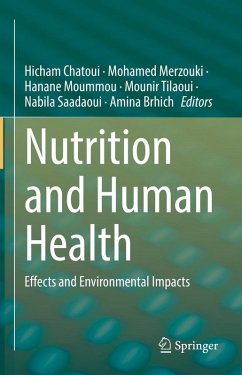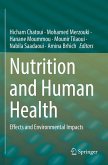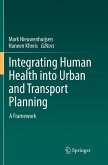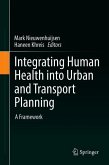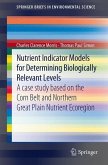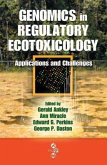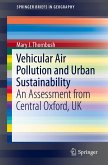Nutrition and Human Health
Effects and Environmental Impacts
Herausgegeben:Chatoui, Hicham; Merzouki, Mohamed; Moummou, Hanane; Tilaoui, Mounir; Saadaoui, Nabila; Brhich, Amina
Nutrition and Human Health
Effects and Environmental Impacts
Herausgegeben:Chatoui, Hicham; Merzouki, Mohamed; Moummou, Hanane; Tilaoui, Mounir; Saadaoui, Nabila; Brhich, Amina
- Gebundenes Buch
- Merkliste
- Auf die Merkliste
- Bewerten Bewerten
- Teilen
- Produkt teilen
- Produkterinnerung
- Produkterinnerung
This book brings together innovative research that examines respectively climate change, agricultural production, environmental impacts, food security, nutrition and human health issues with regard to international policies as well as sustainable development goals.
As sustainability continues to be a high concern in the scholarly community, food security has become a critical worldwide topic. Food supplies are challenged by factors such as toxicity, substandard food processes, difficulties in providing food to struggling populations and changes to the environment due to climate change…mehr
Andere Kunden interessierten sich auch für
![Nutrition and Human Health Nutrition and Human Health]() Nutrition and Human Health116,99 €
Nutrition and Human Health116,99 €![Integrating Human Health into Urban and Transport Planning Integrating Human Health into Urban and Transport Planning]() Integrating Human Health into Urban and Transport Planning165,99 €
Integrating Human Health into Urban and Transport Planning165,99 €![Integrating Human Health into Urban and Transport Planning Integrating Human Health into Urban and Transport Planning]() Integrating Human Health into Urban and Transport Planning165,99 €
Integrating Human Health into Urban and Transport Planning165,99 €![Nutrient Indicator Models for Determining Biologically Relevant Levels Nutrient Indicator Models for Determining Biologically Relevant Levels]() Charles Clarence MorrisNutrient Indicator Models for Determining Biologically Relevant Levels41,99 €
Charles Clarence MorrisNutrient Indicator Models for Determining Biologically Relevant Levels41,99 €![Genomics in Regulatory Ecotoxicology Genomics in Regulatory Ecotoxicology]() Genomics in Regulatory Ecotoxicology198,99 €
Genomics in Regulatory Ecotoxicology198,99 €![Just Enough Nitrogen Just Enough Nitrogen]() Just Enough Nitrogen97,99 €
Just Enough Nitrogen97,99 €![Vehicular Air Pollution and Urban Sustainability Vehicular Air Pollution and Urban Sustainability]() Mary J. ThornbushVehicular Air Pollution and Urban Sustainability38,99 €
Mary J. ThornbushVehicular Air Pollution and Urban Sustainability38,99 €-
-
-
This book brings together innovative research that examines respectively climate change, agricultural production, environmental impacts, food security, nutrition and human health issues with regard to international policies as well as sustainable development goals.
As sustainability continues to be a high concern in the scholarly community, food security has become a critical worldwide topic. Food supplies are challenged by factors such as toxicity, substandard food processes, difficulties in providing food to struggling populations and changes to the environment due to climate change egislation can protect public health, but law-makers must understand the current complications facing food security today. This book features a broad range of topics including ecotoxicology, smart food, and wastewater reuse impacts.
The book aims to look at how we can protect and improve the health of vulnerable populations as well as innovative solutions to food insecurity. It is ideally designed for university students, from undergraduate to Ph.D. level, professors, researchers, professionals, environmentalists, physio-pathologists, medical doctors, epidemiologists, policies makers and sociologists.
As sustainability continues to be a high concern in the scholarly community, food security has become a critical worldwide topic. Food supplies are challenged by factors such as toxicity, substandard food processes, difficulties in providing food to struggling populations and changes to the environment due to climate change egislation can protect public health, but law-makers must understand the current complications facing food security today. This book features a broad range of topics including ecotoxicology, smart food, and wastewater reuse impacts.
The book aims to look at how we can protect and improve the health of vulnerable populations as well as innovative solutions to food insecurity. It is ideally designed for university students, from undergraduate to Ph.D. level, professors, researchers, professionals, environmentalists, physio-pathologists, medical doctors, epidemiologists, policies makers and sociologists.
Produktdetails
- Produktdetails
- Verlag: Springer / Springer International Publishing / Springer, Berlin
- Artikelnr. des Verlages: 978-3-030-93970-0
- 1st edition 2022
- Seitenzahl: 364
- Erscheinungstermin: 29. Juni 2022
- Englisch
- Abmessung: 241mm x 160mm x 24mm
- Gewicht: 777g
- ISBN-13: 9783030939700
- ISBN-10: 3030939707
- Artikelnr.: 63047998
- Herstellerkennzeichnung Die Herstellerinformationen sind derzeit nicht verfügbar.
- Verlag: Springer / Springer International Publishing / Springer, Berlin
- Artikelnr. des Verlages: 978-3-030-93970-0
- 1st edition 2022
- Seitenzahl: 364
- Erscheinungstermin: 29. Juni 2022
- Englisch
- Abmessung: 241mm x 160mm x 24mm
- Gewicht: 777g
- ISBN-13: 9783030939700
- ISBN-10: 3030939707
- Artikelnr.: 63047998
- Herstellerkennzeichnung Die Herstellerinformationen sind derzeit nicht verfügbar.
Hicham Chatoui was born in Beni Mellal (Tagzirt), Morocco, in 1984. He is PhD in neurosciences & physiology, laboratory of environment, neurosciences and pharmacology at the Faculty of Sciences Semlalia of Marrakech and the Faculty of Sciences and Techniques of Beni Mellal. He obtained a master's degree in life sciences and health, option: Anthropobiology. He has been teaching since 2009. He is, actually, Head of Health and Agro-Industry Engineering Department, in the High School of Engineering and Innovation of Marrakesh (E2IM) at the Private University of Marrakesh (UPM). He has published numerous articles and chapters in international journals. He has organized and coordinated several international scientific conferences and congresses. His current research focuses on neurobehavioral and neurophysiological effects of water stress, neuro-immunology, immunology, neurotoxicity, neurotransmitters, behavior (anxiety, locomotor activity, motivation, biomedical engineering, health engineering, nutrition, food safety, environment and climate change. Mohamed Merzouki was born in Fkih Ben Salah, Morocco in 1977. He is currently a University Professor at the Faculty of Sciences and Technology of Beni Mellal, University of Sultan Moulay Slimane. He has published numerous articles and chapters in international journals. His current research focuses on the Marine Biology, Aquaculture, Biostatistical-Biomathematical Modeling in Ecotoxicology, Epidemiology and Climate Change. Hanane Moummou is Professor in the Department of Health and Agro-Industry Engineering and Innovation at Private University of Marrakech, Morocco since 2016. She received her France and Morocco co-directed Ph.D. degree in Biochemistry and Molecular Biology with an emphasis on fruits Genomic and Biotechnology from the University of Caddy Ayyad-Morocco and the University of Paul Sabatierof Toulouse-France. The M.S. degree in water and Environment with an emphasis in automatic analysis and control of water and bio-environmental systems from Caddi ayyad university, Morocco. The Bachelor's degree in food technology from Caddy ayyad university-Marrakech, Morocco. Her research interests lie in the broad areas of biotechnology and bioprocess engineering, the effects of agricultural practices on productivity, Biochemistry, Microbiology, Climate change effects, Food safety and Genomics. Specifically, her research focuses on the following areas: food safety, nurition in disease prevention, Genomic and diversification patterns, biochemical characterisation of plant, enzyms contribution to flavour synthesis in fruits, phytohormones and bioinformatics. Dr. MOUMMOU has published papers in scientific journals such as BMC Plant Biology-Springer, Journal of Plant Physiology-Elsevier and Current Topics in Plant Biology. Her research work was carried out in different countries at the following laboratories: Fruit Genomics and Biotechnology Laboratory-Toulouse- France, Food Sciences FSSM-Marrakech-Morocco, Max Planck Institute, Germany and Krolinska Institute-Centre for Molecular Medicine-Stockholm, Sweden. Mounir Tilaoui received his Ph.D in Pharmacology-Biochemistry from the Faculty of Science and Technology of Beni Mellal in July 2012. His thesis projects were focused on the antitumor activity of natural product: chemical, cellular and molecular analysis. After completion of his degree he was appointed as a postdoctoral fellow in the department of chemical and life sciences, at the Waterford Institute of Technology. Ireland. His research focused on studying the effects of chemopreventive agents on activation of the intrinsic apoptotic pathway in cancer. He then continued at the Sultan Moulay Slimane University another postdoctoral researcher focused on natural product-based anticancerdrug discovery / gene expression profiles for triple-negative breast cancer in Moroccan population. In the autumn of 2018 Dr. Tilaoui joined the Private University of Marrakesh and was appointed as a faculty member. His current work is mainly focused on the anticancer drug discovery. Nabila Saadaoui associate professor at the Private University of Marrakesh (UPM) since 2018. She was born in Sale city, Morocco. She held a PhD in Biochemistry and Environmental Sciences, from Cadi Ayyad University of Marrakech in 2014. She cumulate more than 10 years' experience in research as well as 5 years in teaching in waste management, wastewater treatment and products recycling in agro-food industry. Professor SAADAOUI published numerous articles and held 3 patents, in addition to several scientific presentations at international conferences. She has been a substitute professor at Cadi Ayyad University. She was one of Sustainable Development Goals talent to attend Unleash Innovation lab 2017. Her major interest of current research is focused on bioprocessing of wastes, environmental management and production of valuable bioactive compounds through biotechnologies. Amina Brhich was born in Larache, Morocco, in 1986. She is PhD Student in Ecotoxicology & Medical Toxicology, laboratory of Biological Engineering, FSTBM, USMS, Morocco. She obtained a master's degree in Applied Immuno-Virology and Microbiology, FSTM, UNIVH2MC, Morocco. She was a teacher researcher from 2015 to 2020 at the Private University of Marrakech (UPM). Her current research interests focus on the toxicological effects of neonicotinoid pesticides on honey bees, energetic biomarkers, neurotoxicity, reproductive toxicity, behavior, immunology, food security and environment.
Part I:Climate Changes, Agricultural Productions and Environmental Impacts.- Chapter 1. Climate Change Impact On Agricol Production.- Chapter 2. Bioactive components from agro-food waste: methods of delivery in food products.- Chapter 3. General overview on Water-Energy-Food Nexus.- Chapter 4. Fate and Impact of Pesticides - Environmental and Human Health Issues.- Chapter 5. Metallic Trace Elements in soil: Persistence, Toxicity, Bioaccumulation and Remediation.- Chapter 6Wastewater for Agricultural Production, Opportunities, Challenges and Impacts.- Chapter 7. Alternatives crops as solution for food security under climate changes.- Part II: Food Security Policies and Smart Food.- Chapter 8. Food Security, Legislation and Regulations : Reading of law relating to food safety in Morocco.- Chapter 9. Electrochemical sensors for food quality and safety.- Chapter 10. Nutrigenomics and Transcriptomics for a Personalised Nutrition.- Chapter 11. Modeling of food and nutrition security: Relevance of the PLS Approach to Structural Equation Models.- Part III: Nutrition, Human Health and Food Security.- Chapter 12. Nutrition in Disease Prevention and Food Safety.- Chapter 13. Toxic Plankton Public Health Risks.- Chapter 14. Trace Metals and Food Risks.- Chapter 15. Protein-rich diet and management of hepatic encephalopathy: an overview on the last decade controversy.- Chapter 16. Nutritional diet and health among Moroccan chlidbearing women.- Chapter 17. Effects of mercury on general homeostasis and liver-brain interaction.- Chapter 18. Prostate cancer incidence and the consumable risk factor effect in the Metropolitan City of Ibadan.- Chapter 19. Emerging non-thermal processing effect on foods.- Chapter 20.Food hazards and brain development. The case of cadmium.- Chapter 21. Obesity In School-Going Adolescents.- Chapter 22. Nutritional Aspects and Neurodegenerative Disorders.- Chapter 23. Acrylamide In Nutriments And Human Health: What Are The Effects?
Part I:Climate Changes, Agricultural Productions and Environmental Impacts.- Chapter 1. Climate Change Impact On Agricol Production.- Chapter 2. Bioactive components from agro-food waste: methods of delivery in food products.- Chapter 3. General overview on Water-Energy-Food Nexus.- Chapter 4. Fate and Impact of Pesticides - Environmental and Human Health Issues.- Chapter 5. Metallic Trace Elements in soil: Persistence, Toxicity, Bioaccumulation and Remediation.- Chapter 6Wastewater for Agricultural Production, Opportunities, Challenges and Impacts.- Chapter 7. Alternatives crops as solution for food security under climate changes.- Part II: Food Security Policies and Smart Food.- Chapter 8. Food Security, Legislation and Regulations : Reading of law relating to food safety in Morocco.- Chapter 9. Electrochemical sensors for food quality and safety.- Chapter 10. Nutrigenomics and Transcriptomics for a Personalised Nutrition.- Chapter 11. Modeling of food and nutrition security: Relevance of the PLS Approach to Structural Equation Models.- Part III: Nutrition, Human Health and Food Security.- Chapter 12. Nutrition in Disease Prevention and Food Safety.- Chapter 13. Toxic Plankton Public Health Risks.- Chapter 14. Trace Metals and Food Risks.- Chapter 15. Protein-rich diet and management of hepatic encephalopathy: an overview on the last decade controversy.- Chapter 16. Nutritional diet and health among Moroccan chlidbearing women.- Chapter 17. Effects of mercury on general homeostasis and liver-brain interaction.- Chapter 18. Prostate cancer incidence and the consumable risk factor effect in the Metropolitan City of Ibadan.- Chapter 19. Emerging non-thermal processing effect on foods.- Chapter 20.Food hazards and brain development. The case of cadmium.- Chapter 21. Obesity In School-Going Adolescents.- Chapter 22. Nutritional Aspects and Neurodegenerative Disorders.- Chapter 23. Acrylamide In Nutriments And Human Health: What Are The Effects?

